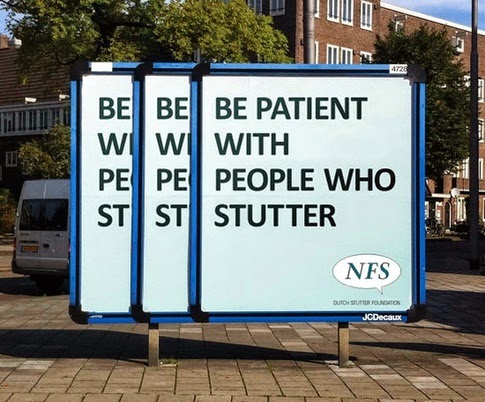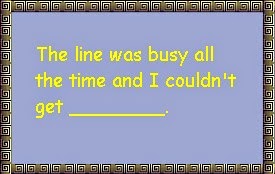 |
| Prepositions: He’s looking at her. |
Las preposiciones en inglés suelen dar bastante dolor de cabeza, como en todos los idiomas. Es uno de los puntos de la gramática inglesa que más problemas da. ¡Parecen tan poco lógicas! Mejor aprenderlas una a una, con unas frases que te ayudan a no confundirte en el futuro. Con calma.
Para hoy tenemos la preposición AT.
La preposición AT se usa para hablar del sitio, del tiempo y , como no, en unas expresiones típicas.
LA PREPOSICIÓN “AT” PARA HABLAR DEL SITIO
Tiene que ser un sitio que podemos considerar como un punto, no un sitio muy, muy amplio. Por ejemplo:
I’ll see you at the mall on Saturday.
Te veré en el centro comercial el sábado.
Consideramos que el centro comercial como un punto de referencia.
We’ll have dinner at my house tomorrow.
Cenaremos en mi casa mañana
We saw a great baseball game at the stadium last night.
Vimos un partido de baseball fantástico en el estadio anoche.
I met my husband at the dentist’s.
Conocí a mi marido en la consulta del dentista.
Where were you on Thursday? ¿Dónde estabas el jueves?
I was at the concert. Estaba en el concierto.
Oh, I thought you were at the pool. Pensaba que estabas en la piscina.
I live at 66 Old Street.
Vivo en el 66 de Old Street.
PERO…
I was in Africa for 3 years.
Estuve en África durante 3 años.
Africa es muy, muy grande y no lo consideramos como un punto. Los países y las ciudades, lo mismo. Consideramos que son sitios que te rodean, que estás dentro.
Unos ejemplos:
I studied in Mexico for 6 months. Estudié en Mejico durante 6 meses.
I live in Yonkers, New York. Vivo en Yonkers, New York.
I sat in traffic for 3 hours! ¡Estuve en un atasco durante 3 horas!
¡PERO OJO!
Quedamos en el parque.
I will meet you in the park. El concepto de estar dentro del parque que nos rodea.
I will meet you at the park. Consideramos el parque como un punto.
Oh dear. Esto se está complicando. Sorry! Vamos a complicarlo un poquito más…
Habrás notado que los verbos en los ejemplos son muy estáticos, no hay movimiento: see, were, study, meet, sit… ¿Qué pasa cuando hay movimiento? Depende del verbo. Muchas veces es TO…
I am going to the concert.
Voy al concierto.
My family moved to Austin when I was 6.
Mi familia se mudó a Austin cuando tenía 6 años.
Etc.
LA PREPOSICIÓN “AT” PARA HABLAR DE LA HORA
at 4 o’clock
at Christmas
at Easter
at night
at noon
at midnight
at the weekend ( in the us, on the weekend)
at the same time
at present
Notice that we say AT for @ .
TYPICAL MISTAKES YOU SHOULD AVOID:
We arrived to the airport. Aigghh!!! ¡¡ Cuidado!!
Es correcto decir: We arrived AT the airport. (We arrived in Paris.)
LLegamos al aeropuerto. Llegamos a Paris.
NEVER “Arrive to”
I was looking the girl. No, no, no!
I was looking AT the girl.
Estaba mirando la chica.
What are you looking at?
¿Qué estás mirando?
OTHER EXPRESSIONS WITH “AT”
 |
| Don’t shout at me! = gritar |
 |
| I’m good at swimming. Soy buena en natación |
 |
| She’s pointing at us.= señalar |
 |
| She is at the computer = en el ordenador |
.
No te pierdas nuestro anterior post…
LA PREPOSICIÓN ON
¿Quieres aprender más inglés? LinguaSuite tiene el mejor curso de inglés online para ti. ¡Apuntate ahora en www.linguasuite.com.
















